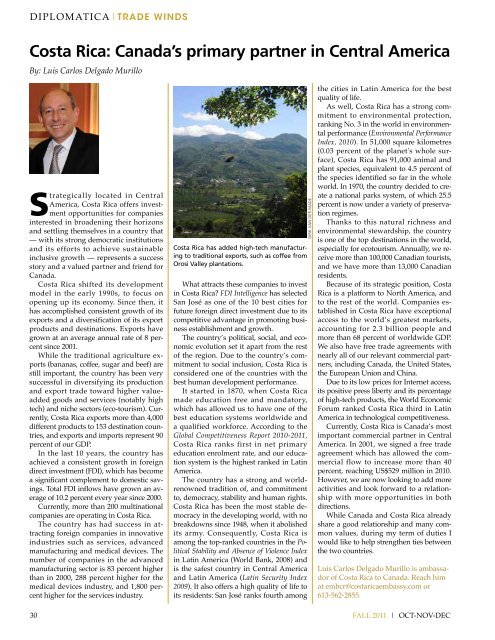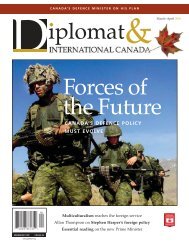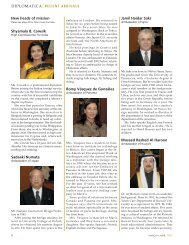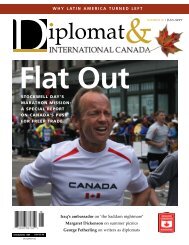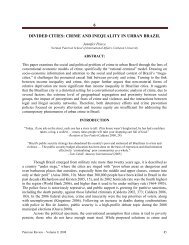the new petro power paradigm - Diplomat Magazine
the new petro power paradigm - Diplomat Magazine
the new petro power paradigm - Diplomat Magazine
Create successful ePaper yourself
Turn your PDF publications into a flip-book with our unique Google optimized e-Paper software.
DIPLOMATICA|TRADE WINDS<br />
Costa Rica: Canada’s primary partner in Central America<br />
By: Luis Carlos Delgado Murillo<br />
Strategically located in Central<br />
America, Costa Rica offers investment<br />
opportunities for companies<br />
interested in broadening <strong>the</strong>ir horizons<br />
and settling <strong>the</strong>mselves in a country that<br />
— with its strong democratic institutions<br />
and its efforts to achieve sustainable<br />
inclusive growth — represents a success<br />
story and a valued partner and friend for<br />
Canada.<br />
Costa Rica shifted its development<br />
model in <strong>the</strong> early 1990s, to focus on<br />
opening up its economy. Since <strong>the</strong>n, it<br />
has accomplished consistent growth of its<br />
exports and a diversification of its export<br />
products and destinations. Exports have<br />
grown at an average annual rate of 8 percent<br />
since 2001.<br />
While <strong>the</strong> traditional agriculture exports<br />
(bananas, coffee, sugar and beef) are<br />
still important, <strong>the</strong> country has been very<br />
successful in diversifying its production<br />
and export trade toward higher valueadded<br />
goods and services (notably high<br />
tech) and niche sectors (eco-tourism). Currently,<br />
Costa Rica exports more than 4,000<br />
different products to 153 destination countries,<br />
and exports and imports represent 90<br />
percent of our GDP.<br />
In <strong>the</strong> last 10 years, <strong>the</strong> country has<br />
achieved a consistent growth in foreign<br />
direct investment (FDI), which has become<br />
a significant complement to domestic savings.<br />
Total FDI inflows have grown an average<br />
of 10.2 percent every year since 2000.<br />
Currently, more than 200 multinational<br />
companies are operating in Costa Rica.<br />
The country has had success in attracting<br />
foreign companies in innovative<br />
industries such as services, advanced<br />
manufacturing and medical devices. The<br />
number of companies in <strong>the</strong> advanced<br />
manufacturing sector is 83 percent higher<br />
than in 2000, 288 percent higher for <strong>the</strong><br />
medical devices industry, and 1,800 percent<br />
higher for <strong>the</strong> services industry.<br />
30<br />
Costa Rica has added high-tech manufacturing<br />
to traditional exports, such as coffee from<br />
Orosi Valley plantations.<br />
What attracts <strong>the</strong>se companies to invest<br />
in Costa Rica? FDI Intelligence has selected<br />
San José as one of <strong>the</strong> 10 best cities for<br />
future foreign direct investment due to its<br />
competitive advantage in promoting business<br />
establishment and growth.<br />
The country’s political, social, and economic<br />
evolution set it apart from <strong>the</strong> rest<br />
of <strong>the</strong> region. Due to <strong>the</strong> country’s commitment<br />
to social inclusion, Costa Rica is<br />
considered one of <strong>the</strong> countries with <strong>the</strong><br />
best human development performance.<br />
It started in 1870, when Costa Rica<br />
made education free and mandatory,<br />
which has allowed us to have one of <strong>the</strong><br />
best education systems worldwide and<br />
a qualified workforce. According to <strong>the</strong><br />
Global Competitiveness Report 2010-2011,<br />
Costa Rica ranks first in net primary<br />
education enrolment rate, and our education<br />
system is <strong>the</strong> highest ranked in Latin<br />
America.<br />
The country has a strong and worldrenowned<br />
tradition of, and commitment<br />
to, democracy, stability and human rights.<br />
Costa Rica has been <strong>the</strong> most stable democracy<br />
in <strong>the</strong> developing world, with no<br />
breakdowns since 1948, when it abolished<br />
its army. Consequently, Costa Rica is<br />
among <strong>the</strong> top-ranked countries in <strong>the</strong> Political<br />
Stability and Absence of Violence Index<br />
in Latin America (World Bank, 2008) and<br />
is <strong>the</strong> safest country in Central America<br />
and Latin America (Latin Security Index<br />
2009). It also offers a high quality of life to<br />
its residents: San José ranks fourth among<br />
Dirk van der Made<br />
<strong>the</strong> cities in Latin America for <strong>the</strong> best<br />
quality of life.<br />
As well, Costa Rica has a strong commitment<br />
to environmental protection,<br />
ranking No. 3 in <strong>the</strong> world in environmental<br />
performance (Environmental Performance<br />
Index, 2010). In 51,000 square kilometres<br />
(0.03 percent of <strong>the</strong> planet's whole surface),<br />
Costa Rica has 91,000 animal and<br />
plant species, equivalent to 4.5 percent of<br />
<strong>the</strong> species identified so far in <strong>the</strong> whole<br />
world. In 1970, <strong>the</strong> country decided to create<br />
a national parks system, of which 25.5<br />
percent is now under a variety of preservation<br />
regimes.<br />
Thanks to this natural richness and<br />
environmental stewardship, <strong>the</strong> country<br />
is one of <strong>the</strong> top destinations in <strong>the</strong> world,<br />
especially for ecotourism. Annually, we receive<br />
more than 100,000 Canadian tourists,<br />
and we have more than 13,000 Canadian<br />
residents.<br />
Because of its strategic position, Costa<br />
Rica is a platform to North America, and<br />
to <strong>the</strong> rest of <strong>the</strong> world. Companies established<br />
in Costa Rica have exceptional<br />
access to <strong>the</strong> world’s greatest markets,<br />
accounting for 2.3 billion people and<br />
more than 68 percent of worldwide GDP.<br />
We also have free trade agreements with<br />
nearly all of our relevant commercial partners,<br />
including Canada, <strong>the</strong> United States,<br />
<strong>the</strong> European Union and China.<br />
Due to its low prices for Internet access,<br />
its positive press liberty and its percentage<br />
of high-tech products, <strong>the</strong> World Economic<br />
Forum ranked Costa Rica third in Latin<br />
America in technological competitiveness.<br />
Currently, Costa Rica is Canada’s most<br />
important commercial partner in Central<br />
America. In 2001, we signed a free trade<br />
agreement which has allowed <strong>the</strong> commercial<br />
flow to increase more than 40<br />
percent, reaching US$529 million in 2010.<br />
However, we are now looking to add more<br />
activities and look forward to a relationship<br />
with more opportunities in both<br />
directions.<br />
While Canada and Costa Rica already<br />
share a good relationship and many common<br />
values, during my term of duties I<br />
would like to help streng<strong>the</strong>n ties between<br />
<strong>the</strong> two countries.<br />
Luis Carlos Delgado Murillo is ambassador<br />
of Costa Rica to Canada. Reach him<br />
at embcr@costaricaembassy.com or<br />
613-562-2855.<br />
FALL 2011 | OCT-NOV-DEC


